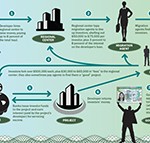Developers, start your engines.
EB-5, a cash-for-green card program that became a key fundraising mechanism for real estate projects, is back from the dead.
Lawmakers finally inked a deal on the EB-5 regional center program that will likely be put forward in a larger spending bill possibly this week. The new deal resolved longstanding disputes with Sen. Chuck Grassley and Sen. Patrick Leahy, who expressed concerns over fraud and abuse in the federal program.
Under the amended rules, the minimum investment amount will increase to $800,000 from $500,000 in high unemployment regions. Other areas will require a minimum investment of $1.05 million. The new plan will also include added integrity measures to prevent fraud, including sanctions if a regional center files misstatements.
In addition, only the federal government can designate which areas are considered “high unemployment.” In the past, state governments could exercise their own discretion.
The program will be authorized through September 2027, doing away with the need for constant short-term extensions.
Read more


The program was designed to give foreign investors the ability to obtain a green card in exchange for investing in job-creating U.S. businesses. It became a favorite among developers, who tapped into the program to obtain cheap financing for megaprojects such as Hudson Yards and Brooklyn’s Atlantic Yards and was used as a replacement to pricier mezzanine financing. But in recent years, developers turned to alternative forms of financing in part because of allegations of fraud among EB-5 projects and investors’ frustrations with long wait times for green cards.
Last summer, Congress failed to reauthorize the program after lawmakers could not come to an agreement. One regional center, Behring Co., filed a lawsuit in federal court in California against the USCIS, the Department of Homeland Security, and the Department of State, alleging the agencies exceeded their authority in shutting down the regional center program last year. Behring previously won a federal lawsuit that would have nearly doubled the minimum investment amount from $500,000.
